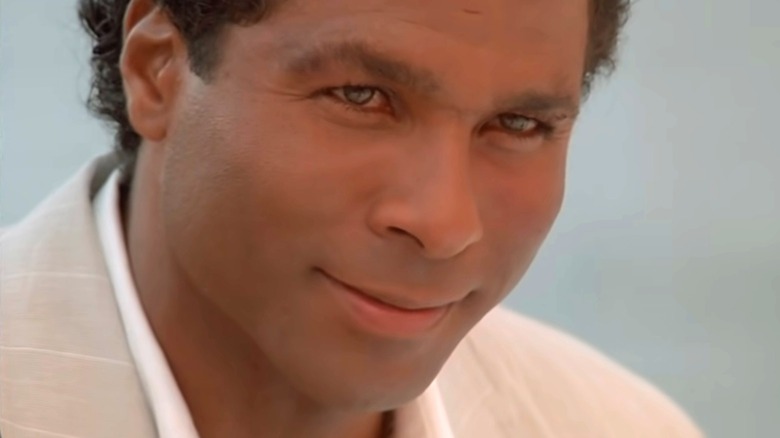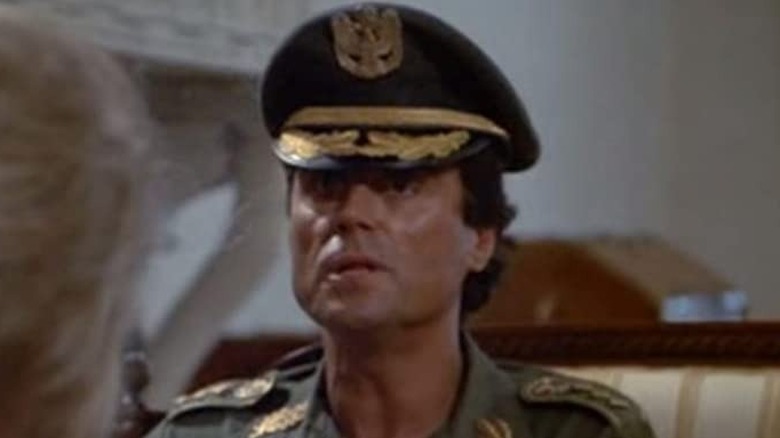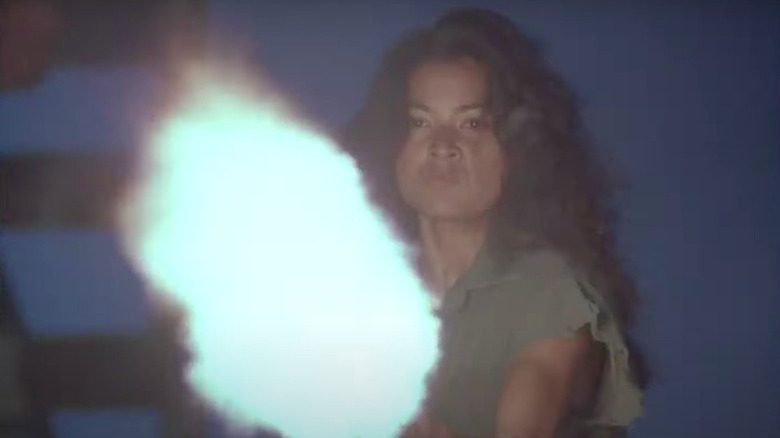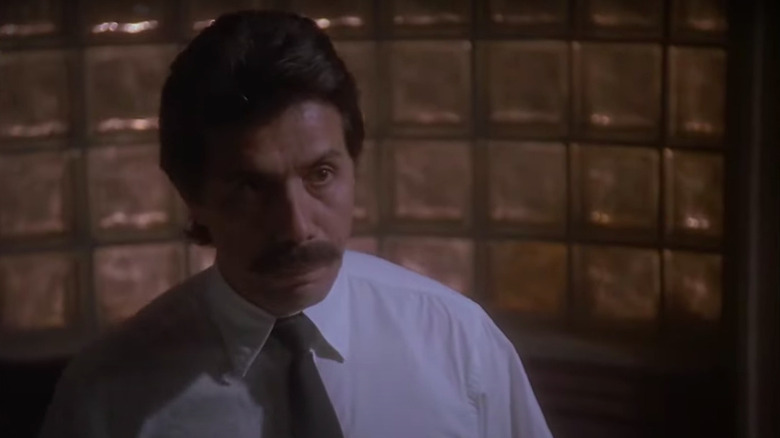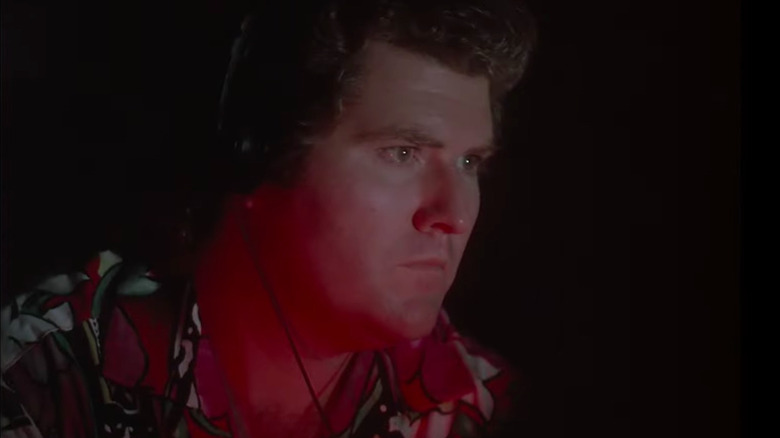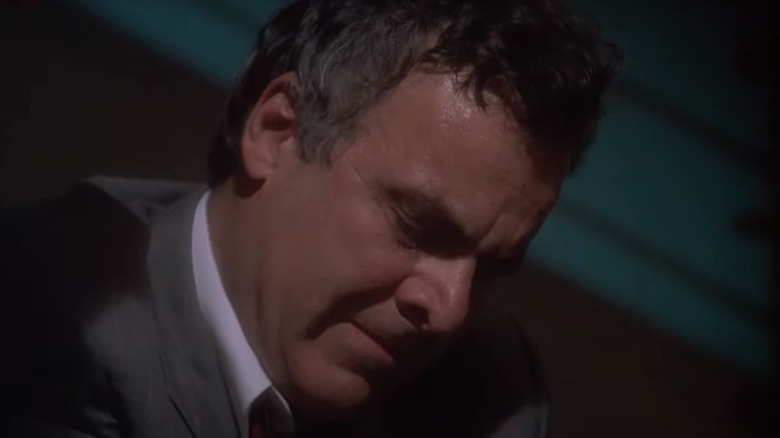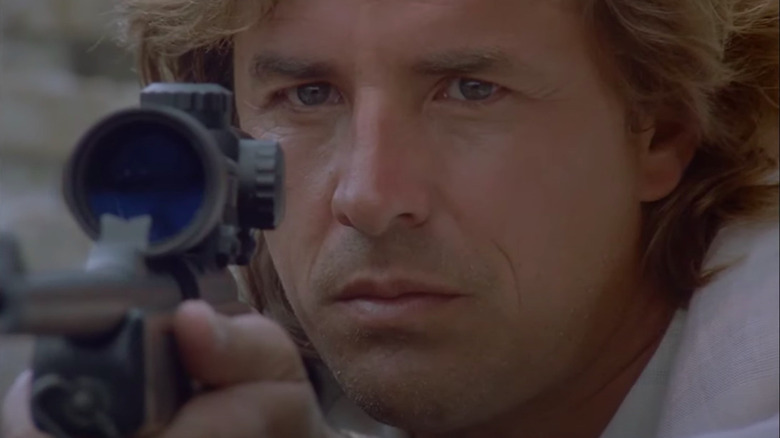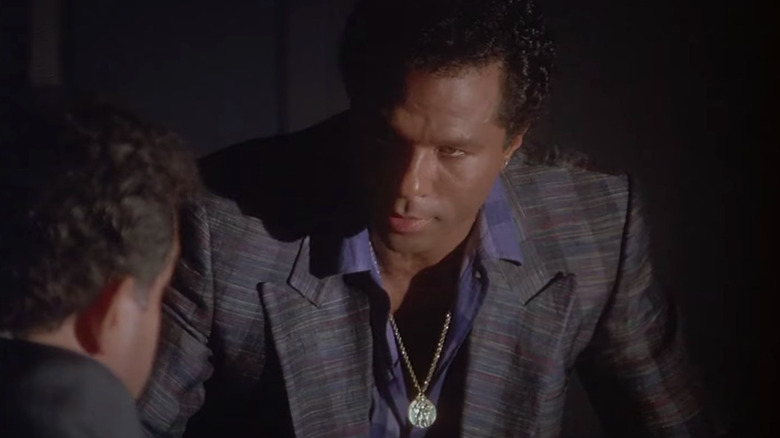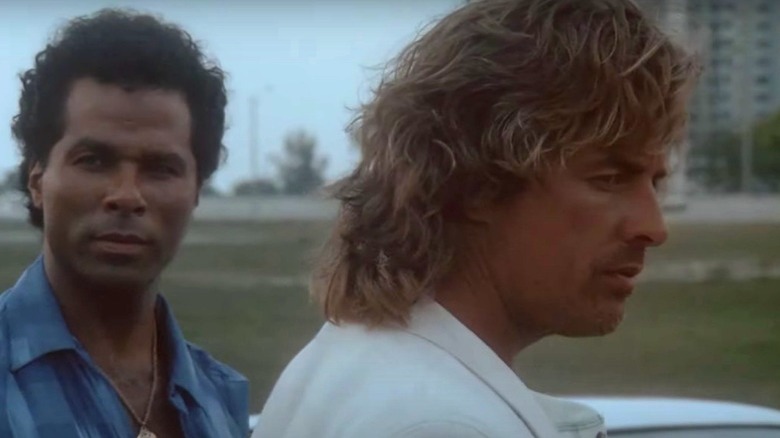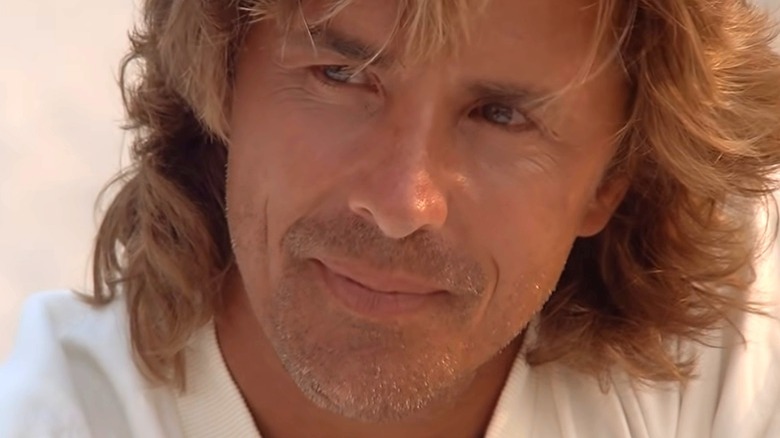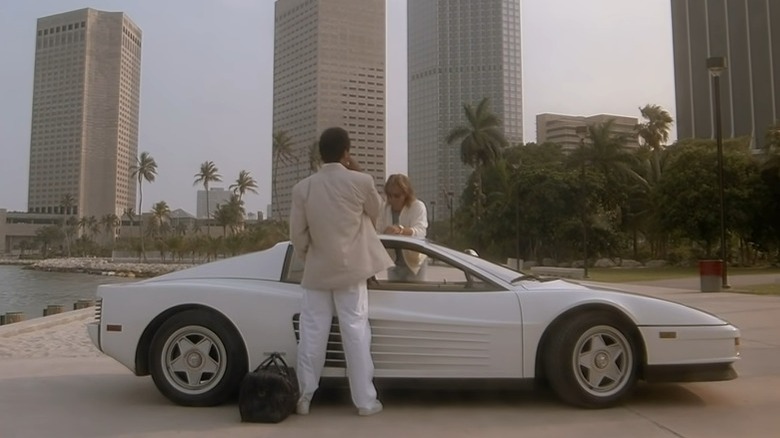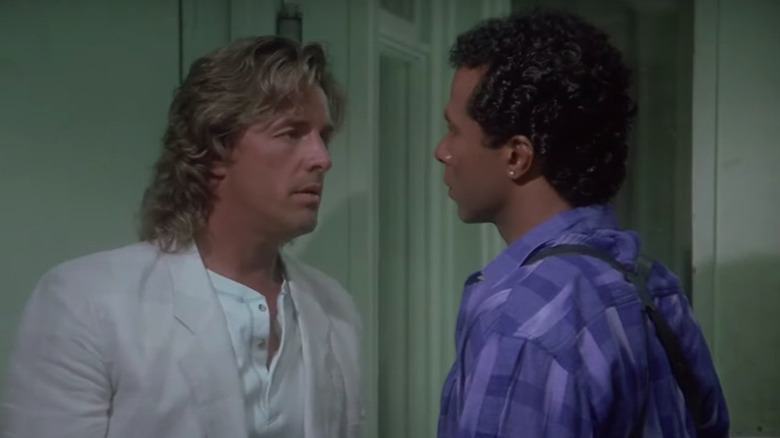The Ending Of Miami Vice Explained
"Miami Vice" is fondly remembered for its style, combining pop music and audacious fashion to create a singular police drama for the MTV generation. Showrunner Michael Mann ("Heat," "Public Enemies") imbued "Miami Vice" with a cinematic flair that had rarely been seen in the television space. Thanks to its impressive production values and unique aesthetics, "Miami Vice" still feels unique decades after its 1984 debut.
In addition to its unique audio and visual style, "Miami Vice" is also noteworthy for its storytelling. The show follows James "Sonny" Crockett and Ricardo "Rico" Tubbs, played by Don Johnson and Philip Michael Thomas, respectively. As soldiers in the infamous war on drugs, Crockett and Tubbs work undercover to fight against drug dealers and other forms of organized crime, like gambling and prostitution.
After five seasons, "Miami Vice" had run its course. The series ended on May 21, 1989, with a grand finale, "Freefall." Like the pilot and several other episodes, "Freefall" aired as a two-hour TV movie. The episode reflects the themes of the series and builds on the subtext that had been hinted at ever since the pilot episode but became increasingly pronounced during the fifth and final season. In the end, "Freefall" provides a definitive, if controversial, conclusion to the story of "Miami Vice."
Borbon and Montoya
In addition to the show's regular cast, the main player in "Freefall" is General Manuel Borbon, played by Ian McShane. He's the militaristic dictator of the fictional Latin American nation of Costa Morada. His country is in the midst of a social revolution, with revolutionaries fighting to overthrow Borbon's government. In the midst of this unrest, Borbon plans to flee the country, seeking refuge in the United States. In exchange for his own safety, Borbon plans to rat out his contacts in the drugs trade. Thus, Borbon is also pursued by Caesar Montoya (Alfredo Alvarez Calderon), a representative of the real-life Medellin cartel network. Montoya aims to scare Borbon into remaining in country and plans to kill him to protect the cartel's secrets if he tries to find asylum in the United States.
The politics of Borbon and Costa Morada are loosely inspired by those of real-life Latin American countries like Panama and Nicaragua. In those countries, right-wing military leaders seized control and were opposed by Communist-leaning militias around the time of the Miami drug war, with America's CIA often playing a behind-the-scenes role in propping up whichever regime served so-called American interests. A previous episode, Season 3's "Stone's War," dealt specifically with American intervention in Nicaragua.
Since many episodes of "Miami Vice" deal with Latin American drug kingpins, it makes sense for the final episode to revolve around the cross-section of Latin American politics and the drug trade in a more direct and grandiose way than ever before.
One last mission
Following the intro involving General Borbon, the episode proper begins with Crockett and Tubbs tailing Johnny Ramon, a drug dealer played by Greg Germann, while reflecting on their lives and careers. Crockett is particularly burned out and fails to see the point in continuing on as a vice cop, though Tubbs tries to reassure him that it's just part of the job. In any case, their stakeout is interrupted by Colonel Andrew Baker of the Drug Enforcement Task Force. Baker and Miami's Chief of Police Richard Highsmith recruit Crockett and Tubbs for a high-stakes mission.
Their task is to extract General Borbon from Costa Morada. According to Baker, Borbon has agreed to trade information on major cartel players in exchange for his safety. This is why Montoya wants him dead.
Most of the first half of "Freefall" focuses on Crockett and Tubbs fighting for their lives in Costa Morada while trying to complete their mission. Tubbs is inspired by a nun named Felicia, who fights for the freedom of her people as a guerilla soldier. Sadly, she's killed during Borbon's extraction, shot to death while trying to rescue the man she's spent years trying to overthrow. Tubbs is shaken by Felicia's death, but the mission is successful when Crockett and Tubbs take custody of Borbon and return him to Miami. They stash the dictator in a secure safehouse, guarded by fellow vice officers (and series regulars) Trudy Joplin, Stan Switek, and Gina Calabrese.
Switek's gambling debts
Throughout Season 5, Stan Switek (Michael Talbott) struggles with his addiction to gambling. The episodes "Hard Knocks" and "Too Much, Too Late" both deal with Switek's addiction and growing gambling debts, and this storyline comes to a head in "Freefall." After Borbon is hidden away in a secret Miami safe house, Montoya tries to squeeze Switek to ascertain his target's location. To that end, Montoya buys up all of Switek's gambling debt and tries to blackmail the vice cop into selling out his values in exchange for wiping away his debts.
To Switek's credit, despite getting beat up by Montoya's thugs, he refuses to talk. However, Montoya's men figure out the location of the safehouse anyway, as they are also tailing Borbon's girlfriend as she travels to and from a bank. While the vice cops are able to repel the attack by gunning down the hit squad, Lieutenant Castillo (Edward James Olmos) decides he can't trust Switek anymore and suspends him, relieving him from duty for the foreseeable future. He laments that he didn't confront Switek over his gambling habit before it reached this point, but he has to take him off the case as his addiction has become a liability.
Switek goes rogue
Pushed to the edge, Switek takes matters into his own hands. He gives a tip to Montoya, leading the cartel boss to a warehouse on the docks. Though he doesn't go in himself, Montoya sends his men to investigate what they believe to be Borbon's location but is actually a trap set by Switek. Watching from his surveillance van, Switek plays a pre-recorded video inside the warehouse of himself saying that he has nothing to lose now that he's gotten into trouble with Castillo.
He warns the intruders that he's set a bomb in the warehouse, causing the trio of hitmen to run out. There's no bomb, but Switek is waiting for them and opens fire. If only Montoya had taken the bait himself, Switek could have ended the cartel threat all by himself. Still, though he likely won't be getting a medal for his rogue actions, he does redeem himself in his own eyes, getting revenge on the cartel and taking down some of their best gunmen. As an added bonus, he's effectively canceled his own gambling debt.
Interestingly, Switek appears alongside the vice squad in a later shootout sequence. It's unclear if he's been reinstated or if the circumstances were so dire that he was able to just show up and help out. As a result, Switek's status at the end of the series is unknown. Is he still a cop? Will he face legal consequences for going rogue? We can only guess.
A conspiracy revealed
Crockett and Tubbs split up to go pursue two separate leads. Crockett goes to Borbon's accountant, while Tubbs pays a visit to Johnny Miranda, Montoya's money man. Things don't go well for Tubbs, whose visit with Miranda gets interrupted by Montoya and his goons. Outgunned and outmanned, Tubbs is taken hostage and held captive in a nondescript trailer park by the water. Montoya calls Crockett and demands that he deliver Borbon in 12 hours or else Tubbs will be executed.
Crockett's visit to Borbon's accountant leads him to discover that the chief of police, Richard Highsmith, is on the take for Montoya. As per usual in "Miami Vice," Highsmith is a cop driven by financial and political gain, not devotion to the law or the streets of Miami. Notably, the character of Highsmith, as played by Robert Fields, previously appeared in the episode "Over the Line," which first showed his opportunistic, morally flexible nature. Crockett basically assaults Highsmith until he reveals where Montoya took Tubbs, and they head out to rescue Crockett's captive partner.
Rescuing Tubbs
The vice squad (including Switek) and Chief Highsmith show up at Montoya's trailer. Highsmith runs point and exposes himself to danger, knocking on the door and demanding Tubbs be released. Montoya responds, asking for Borbon (who is still on the loose). In a pragmatic and ruthless move, Crockett takes a sniper shot that hits the guard holding Tubbs hostage, thus allowing him to run out of the trailer and escape, but leaving Highsmith to be shot to death by Montoya.
Crockett essentially sacrifices Highsmith. He was dirty, sure, but he was also Miami's chief of police. Even so, with the choice of saving his partner and best friend or protecting a crooked opportunist, few would argue against Crockett's decision.
A shootout ensues, with a heavily-armed team of Miami cops armed with M16 rifles pumping so many bullets into Montoya's trailer that it collapses. It's an impressive display of firepower that wouldn't feel out of place in a "Predator" movie. Needless to say, they kill Montoya and all of his men. With the immediate threat to Borbon's life resolved, Crockett and Tubbs decide to finally hand over Borbon to Baker's federal agents, but they're intercepted by none other than Johnny Ramon, who executes Borbon and steals his body, seemingly ending the story on a sour note.
Crockett and Tubbs go rogue
Borbon's body is recovered, burned beyond recognition, but when Crockett reads the autopsy report, he notes inconsistencies, like how there's no note of the gunshot wound Borbon received during his extraction from Costa Morada. When Crockett asks the coroner about this, she replies that she didn't perform any autopsy. Crockett and Tubbs realize that they've been duped from the very beginning. Borbon's death was faked, and his extraction wasn't to get dirt on big-time drug dealers — it was to protect Borbon's contacts in the US government. They get this information, and Borbon's current location, from his girlfriend, whom he scorned to escape on his own.
Sick of being played by criminals and so-called cops alike, Crockett and Tubbs decide they're going to take down Borbon, no matter what. In a sequence set to Honeymoon Suite's "Bad Attitude," they storm Borbon's security detail, gunning down numerous government agents (presumably from the DEA or Baker's Drug Enforcement Task Force) before shooting down Borbon's seaplane, which explodes in a spectacular display.
And pay the price, but keep their souls
Before they can leave the site of their extra-legal massacre, Crockett and Tubbs are confronted by Colonel Baker and his team of heavily-armed agents. Baker threatens to have his men murder Crockett and Tubbs in cold blood, saying he could pin the blame on Borbon and nobody would bat an eye. Defiant to the end, Crockett and Tubbs dare him to do it, "if you've got the stones." Castillo shows up in time to help deescalate things, but when Baker threatens to have them removed from the police force, Crockett and Tubbs once again call his bluff and throw away their badges, despite Castillo's protests.
Considering how many US agents they essentially murdered to get to Borbon, it's a miracle Crockett and Tubbs managed to escape with their lives. Baker could have easily ordered his men to gun them down, but perhaps he was worried about getting killed himself in the crossfire of a hypothetical gun battle with two renegade vigilantes with nothing left to lose. Baker might have the law on his side, but he's completely lost touch with the concept of justice, and he knows better than to take on Crockett and Tubbs, who have genuine righteousness on their side, not to mention support from Castillo, who would surely take their side in the event of a shootout.
In any case, Crockett and Tubbs are finished. Their tenure fighting the good fight on the streets of Miami is over.
Hey Tubbs, ever consider a career in southern law enforcement?
The final scene of "Miami Vice" sees Crockett on his houseboat, the St. Vitas Dance, except it's not really his houseboat. Almost everything he owns, from his designer clothes to his car and boat, is the property of the Miami Police Department. He was only allowed to use them due to his status as an undercover cop. Tubbs visits one last time, and they ponder what they will do next.
Tubbs will return to the Bronx, New York. He probably won't be allowed to be a cop anymore, but perhaps he'll become some kind of community leader, inspired by the selfless nature of Felicia, who sacrificed herself for the people of Costa Morada. As for Crockett, he aims to travel somewhere south of Florida and live out the rest of his days as something of a beach bum — easier said than done, considering he has no pension. As an honest cop, he never built an illicit retirement fund of stolen goods.
Crockett offers to drive Tubbs to the airport, and they set out in Crockett's famous Ferrari Testarossa, which is technically stolen at this point. As they drive off, audio from the pilot episode can be heard, with Crockett asking, "Hey Tubbs, ever consider a career in southern law enforcement?" This segues into a special end credits sequence set to "Tell Me" by Terry Kath, featuring numerous clips from across the five-year run of "Miami Vice."
Miami Vice, Capitalism, and the war on drugs
The ending of "Miami Vice" might surprise those who remember the show as a glorification of the war on drugs. In fact, "Miami Vice" was quite the opposite. From the very beginning, the show criticized the drug war and America's driving force in the 1980s: capitalism. Drug kingpins were depicted as businessmen adhering to the rules of supply and demand, while good cops turn bad in exchange for bribes to facilitate the economy of vice. Are they bad cops? Or are they good capitalists? Meanwhile, drug dealers insult Crockett and Tubbs by calling them "$400-a-week cops" who value their own integrity more than the almighty dollar.
"Miami Vice" was always a lot more than sunshine, pop songs, and bright clothing. It was one of the most politically-charged shows of the 1980s, and many of its best episodes remain noteworthy for condemning capitalism and calling out the continued failure of the war on drugs. Crockett and Tubbs rarely get jurisdiction to travel outside of Miami, which means they frequently do battle with local drug dealers who are often supplied by kingpins who operate out of Latin America, far from the shores of Florida. As a result, whenever they take down a dealer, another one pops up to take its place, leaving the cops playing "whack-a-mole," never having the opportunity to stop the drugs at their source — but the true source of the problem is insatiable consumer demand for illegal drugs.
Season 5's subtext
The desperate hopelessness of the war on drugs takes its toll on Crockett and Tubbs over the course of "Miami Vice," but it's at its most pronounced in Season 5. Several episodes feature Crockett and Tubbs discussing their feelings of burnout since they've fought the war on drugs for five years together and scarcely made a difference. They haven't made any kind of meaningful dent in the drugs trade, but they've lost much along the way.
Crockett's first marriage ended in divorce, and his second ended with the tragic death of his wife, after which he murdered her killer in cold blood. As for Tubbs, he lost his girlfriend, Laura, in a senseless shooting in Season 3's "Walk-Alone," one of the series' best episodes. More recently for him the episode "Too Much, Too Late" sees the return of his longtime squeeze, Valerie Gordon (Pam Grier), before things turn sour and Tubbs is ultimately left alone, again.
By the time "Freefall" begins, the writing is very much on the wall for Crockett and Tubbs. Their hearts aren't in their job anymore, and they're bitter, jaded, and cynical — especially Crockett. With that in mind, and all the baggage of the last five years weighing on them, it's no wonder the show ends with Crockett and Tubbs throwing away their badges in disgust, casting aside the justice system forever in order to save what's left of their souls.
